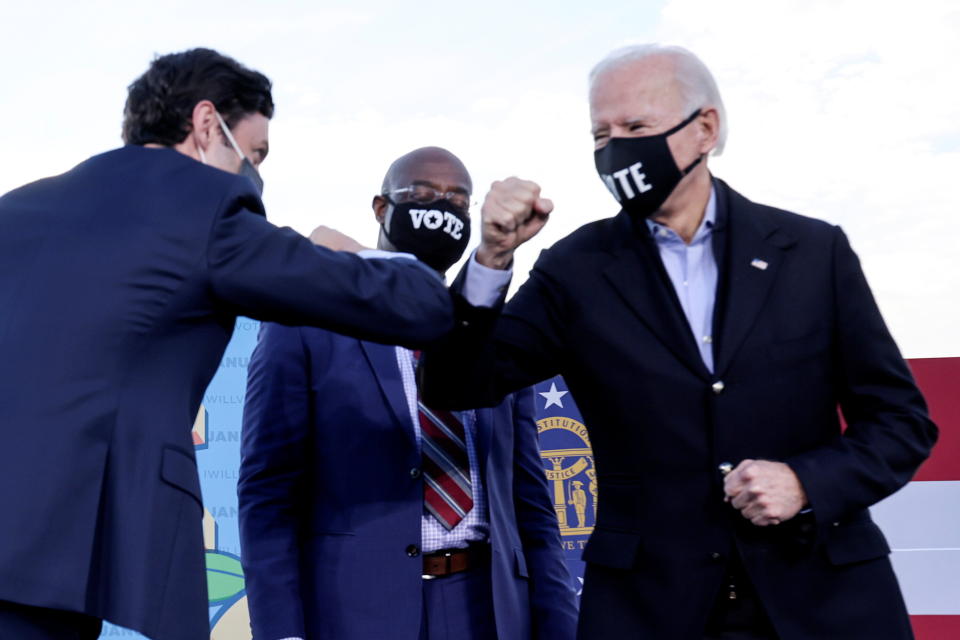What A Fight Over $2,000 Checks Says About The Left's Approach To Biden
- Oops!Something went wrong.Please try again later.
When President Joe Biden announced his $1.9 trillion COVID-19 relief bill last week, the opening bid drew mostly positive reviews from progressive observers.
But a handful of influential left-wing members of Congress, activists and commentators cried foul, arguing that Biden’s proposal failed to deliver on his promise to provide all lower- and middle-income households with $2,000 relief payments.
Biden is asking Congress to send $1,400 checks to all Americans. Together with a previous allotment of $600, the payments come to $2,000.
Biden’s left-wing critics, including Democratic Reps. Cori Bush (Mo.), Rashida Tlaib (Mich.) and Alexandria Ocasio-Cortez (N.Y.), maintain that Biden promised to provide $2,000 payments on top of the $600 already distributed. Anything short of that, these critics maintain, betrays the Georgia voters who cast votes for Democrats in the Jan. 5 Senate runoffs based on the promise of $2,000 payments.
“The promise was for $2,000 survival checks,” tweeted Nina Turner, a close ally of Sen. Bernie Sanders (I-Vt.). Turner is running in a special election to fill an open House seat from Cleveland, Ohio.

The debate is about more than just the size of the cash payments: It reflects a larger argument over the most effective ways for the activist left to push Biden over the course of the next four years.
On one side are lawmakers, activists and media personalities who have seized on the $2,000 payments as a means of signaling their skepticism of Biden and vigilance against any missteps.
A second, larger camp of progressives regards criticism of the checks as a tactical error that undermines the left’s credibility and detracts from other priorities.
The negative reaction to Biden’s proposal was “a bit myopic,” said Sean McElwee, a co-founder of the think tank and polling firm Data for Progress, who has consulted for groups that were instrumental in Ocasio-Cortez’s and Bush’s primary wins. “It speaks to the extent to which a lot of leftist discourse is a deeply surface-level analysis of politics.”
Biden and his team maintain that he never intended to promise more than $2,000 total. In an implicit nod to the objections, on Jan. 14, then-Vice President-elect Kamala Harris tweeted out Biden’s full remarks on the subject.
“We will finish the job of getting a total of $2,000 in cash relief to people who need it the most,” she quoted him as saying. “The $600 already appropriated is simply not enough.”
Indeed, left-wing critics of Biden’s proposal do not exactly have the facts on their side.
When then-President Donald Trump blew up congressional negotiations with his Dec. 22 call to deliver $2,000 payments, rather than $600 checks, Reps. Tlaib and Ocasio-Cortez jumped at the opportunity.
Hours after Trump’s comments, the congresswomen drafted an amendment increasing the payments in a recently passed bill from $600 to $2,000. Just over a week later, the House passed an identical bill with a symbolic voice vote. But then-Senate Majority Leader Mitch McConnell (R-Ky.) blocked consideration of the bill in the Senate. Trump ended up signing the bill with $600 payments.
Democrats subsequently used McConnell’s obstruction of the bill to help flip two Republican-held Senate seats in Georgia.
Warren Gunnels, a senior aide to Sanders, whose advocacy for cash relief helped ensure its inclusion in the original relief package, described Biden’s proposal as both a fair effort to deliver on his promise as well as a major improvement on the status quo.
“We fought like hell to get [$2,000] done, the GOP blocked it,” Gunnels tweeted. “Now, Biden included it in his plan. Folks, that’s a good start.”
Pressed on the matter, some progressive critics of the Biden proposal, including the hosts of the popular podcast “Chapo Trap House,” have been willing to concede that Biden always intended to supplement the $600 payments rather than add $2,000 to the existing $600 payments.
But regardless of the fine print of Biden’s plan, he and Raphael Warnock and Jon Ossoff blurred that distinction in order to win favor with Georgia voters before their successful Senate elections, the critics maintain.
“We’ll put an end to the block in Washington on that $2,000 stimulus check ― that money that will go out the door immediately,” Biden told Democrats at a rally for Warnock and Ossoff on the day before the runoffs. “There’s no one in America with more power to make that happen than you the citizens of Atlanta, the citizens of Georgia. And that’s not an exaggeration. ... That’s literally true.“
In a tweet attacking his Republican opponent, then-Sen. Kelly Loeffler, Warnock simplified the proposition as well. “Want a $2,000 check? #VoteWarnock,” the tweet said in a graphic featuring a $2,000 check from the U.S. Treasury.
It’s inevitable that a significant number of Americans will feel like a promise was broken if they get a $1,400 check in the mail instead of a $2,000 check. Claire Sandberg, former Bernie Sanders campaign official
To avoid the perception of falling short of his promises and fortify Warnock, who is up for reelection in 2022, these progressives want Biden to err on the side of generosity and make the payments $2,000 rather than $1,400. After all, the first $600 payment had Trump’s signature on it.
“The promise of ‘$2,000 checks’ was reiterated many times, including after $600 checks went out the door,” Claire Sandberg, a progressive organizer and former senior official on both of Sanders’s presidential campaigns. “It’s inevitable that a significant number of Americans will feel like a promise was broken if they get a $1,400 check in the mail instead of a $2,000 check.”
In a note to a group of socialists, David Duhalde, a vice chair of the Democratic Socialists of America Fund, the DSA’s philanthropic arm, acknowledged the merit of the critique of Biden’s proposal before suggesting that an ill-fated battle to increase the payments risked making the left appear weak.
“Jumping on a misunderstanding to make it look like we, the left, are losing, is a self-own,” he wrote.
Spokespeople for Biden, Warnock and Ossoff did not respond to HuffPost’s requests for comment on Sandberg’s argument and the overall critique of the politics of the relief checks.
Regardless, it does not look like the left-wing members of Congress who initially expressed disappointment in Biden are pressing forward with the matter. Spokespeople for Reps. Bush and Tlaib, as well as Justice Democrats, a group aligned with them, did not respond to a request for comment on whether they would mobilize against a bill that does not include a full $2,000 check. A spokesperson for Ocasio-Cortez declined to comment.
Instead, progressive leaders in Congress are using the occasion to reiterate their calls for recurring monthly cash payments of $2,000.
Rep. Ilhan Omar (D-Minn), the Congressional Progressive Caucus whip, said on Twitter that she and other progressives are soliciting support from House colleagues for a letter to Biden calling for recurring checks.

“One more check is not enough during this public health and economic crisis,” Omar states in the letter obtained by HuffPost. “To truly build back better, families need stability and certainty through ongoing relief ― they cannot be at the mercy of Congressional gridlock.”
One reason progressive activists and lawmakers are so invested in the cash payments debate one way or another is that they see it as a backdoor route to the establishment of more permanent cash assistance, such as a universal basic income program.
They have also been eager to tout the political benefits of promising and delivering on material improvements in ordinary Americans’ lives. In an effort to combat claims that left-wing slogans had hurt Democrats at the polls in November, the climate-focused Sunrise Movement, Data for Progress and Justice Democrats jointly published a memo advising Democrats to turn the Senate runoffs in Georgia into a referendum on $1,200 stimulus checks.
But Data for Progress’s McElwee contends that increasing pandemic unemployment benefits and increasing federal aid to state and local governments should be higher priorities than pressing Biden to up the onetime payment from $1,400 to $2,000.
He is also concerned about lawmakers’ vulnerability to pressure from a new crop of left-wing media influencers, such as Jimmy Dore, who seem more concerned with growing their audiences than with advancing practical solutions. Following the November election, Dore, a populist shock jock whose YouTube channel has more than 850,000 subscribers, led a sometimes nasty campaign to get left-wing members of Congress to withhold their support for House Speaker Nancy Pelosi (D-Calif.) unless she agreed to allow a vote on Medicare for All.
Dore panned Biden’s proposal on his Tuesday show. After playing a clip of Biden using the word “literally” in his Atlanta speech, Dore joked that Biden was “literally full of shit” about the $2,000 checks.
“Progressives who understand this stuff and have a policy platform really shouldn’t be allowing the message to be overtaken by people who don’t have strategic instincts and are largely trying to build media platforms for themselves,” McElwee said. “Because ultimately that will redound negatively to the health of our movement and our ability to deliver smart and effective policy concessions.”
This article originally appeared on HuffPost and has been updated.

